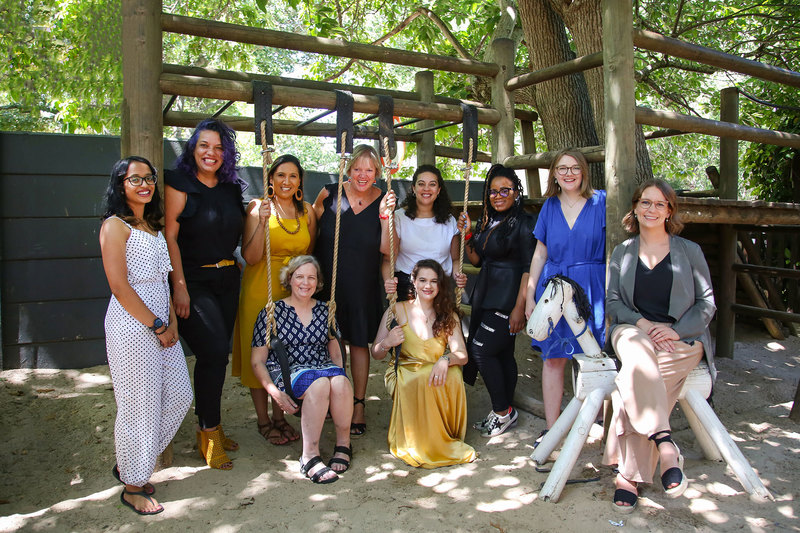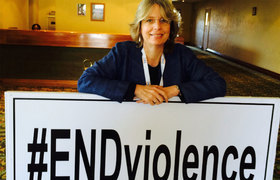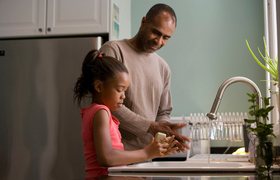Global Parenting Initiative helps children thrive
08 December 2022 | Story Niémah Davids and Annathea Oppler. Photo Je’nine May. Read time 9 min.
A five-year project designed to develop and boost human–digital evidence-based playful parenting programmes will equip parents and caregivers with the skills they need to help their children reach their full potential and reduce the scourge of violence against children globally.
Between 2019 and 2020, the World Health Organization (WHO) estimated that up to one billion children aged between 2 and 17 experienced physical, sexual or emotional violence or neglect. And about 250 million children under the age of five, especially those living in low- and middle-income countries, were at risk of not achieving their developmental potential. The COVID-19 pandemic has added to these numbers, placing further strain on parents and caregivers across the globe – highlighting the urgent need for effective parenting support that is relevant and responsive to the challenges parents and caregivers experience.
The Global Parenting Initiative
The Global Parenting Initiative (GPI) provides the support parents need. The GPI is committed to researching, developing and implementing innovative, human–digital hybrid parenting programmes designed for large-scale delivery in low- and middle-income countries. The initiative is a joint collaboration between the University of Oxford and the University of Cape Town (UCT), as well as eight other academic institutions in the Global South, local non-governmental organisations (NGO) and inter-governmental organisations.
The project is spearheaded by the University of Oxford’s Dr Jamie Lachman and is being led in South Africa by UCT’s Professor Cathy Ward. Professor Ward is the director of UCT’s Safety and Violence Initiative based in the Centre for Social Science Research. She is also one of the founders of Parenting for Lifelong Health (PLH) – a suite of open-access, non-commercialised parenting programmes designed to prevent child abuse and other forms of violence in low-resource settings around the world. Endorsed by the WHO, PLH’s in-person programmes have demonstrated remarkable success in improving parent–child relationships, increasing child safety and boosting children’s cognitive and socio-emotional development. On the back of this, the GPI is optimising these in-person programmes for digital and human–digital hybrid use in large-scale settings and subjecting them to rigorous scientific tests. The project aims to provide 25.7 million families in the Global South with free, evidence-based playful parenting support and has hopes of reaching 250 million children by 2030.
“These programmes will equip parents and caregivers with a valuable tool set of playful parenting skills and stress management techniques.”
“These programmes will equip parents and caregivers with a valuable tool set of playful parenting skills and stress management techniques. They will help to prevent violence against children and provide parents with the knowledge to help their children realise their full potential,” Ward said.
Promoting positive parenting
Ward said the playful parenting concept promotes positive parenting behaviours that are essential to foster healthy childhood development.
“Playful and positive parenting cultivates nurturing, empowering and non-violent behaviours, and provides recognition and guidance, while setting boundaries to enable the full development of the child.”
And the United Nations International Children’s Emergency Fund (UNICEF) agrees. UNICEF states that supporting families, parents and caregivers to learn positive, playful parenting techniques will help to prevent a host of negative outcomes, including child maltreatment, family separation, parental conflict and intimate partner violence, and violent behaviour among children and adolescents.
“Parenting programmes have also been found to have intergenerational benefits, helping to break generational cycles of violence, and improving children’s life chances,” Ward added.
Digital parenting programmes for the Global South
While the long-lasting benefits of parenting programmes have been acknowledged, Ward said access to evidence-based parenting programmes that improve outcomes for children have been limited for most of the world’s parents. But as the globe was forced to digitise at the onset of the COVID-19 pandemic, it presented an opportunity to extend the reach and accessibility of parenting resources to more parents and caregivers worldwide.
“The GPI has taken this opportunity to conduct ground-breaking research with families across the Global South – including in Africa, Asia and Latin America & the Caribbean – to rapidly adapt, develop and scale up in-person, remote, digital, hybrid, and multimedia parenting programmes, with the goal of making these programmes freely available to parents globally,” she said.
“Parenting is fundamental to children’s ability to thrive, and low-resourced contexts make life very difficult for parents.”
This process also involves developing the open-source digital infrastructure to deliver GPI’s programmatic offerings like the ParentApp – an app-based parenting support for parents of teens and young children; ParentText – a chatbot for parents of children between the ages of 0 and 17; and ParentChat – multiple live online parenting support groups delivered via platforms such as WhatsApp. These hybrid platforms are accessible across a range of digital services (they are available offline if internet access is a challenge), are modifiable to different cultures and contexts, and scalable to meet population-level demand. Ward said early research that examined the effectiveness of these programmes indicated promising results. These, she explained, include increased positive parenting techniques, reduced cases of violence against children, a decline in child behavioural challenges, fewer cases of parent stress and depression, and reduced numbers of intimate partner violence and victimisation.
Supporting parents everywhere
But developing these programmes alone won’t be enough to make the difference the GPI envisions.
“Parenting is fundamental to children’s ability to thrive, and low-resource contexts make life very difficult for parents. Parenting support is a right which should be afforded to all parents,” Ward said. “It’s for this reason that we need to take it a step further. We need to advocate for policy change at a national level, based on evidence, to support the sustained institutionalisation of parenting programmes globally. To address this, the GPI is working alongside interagency partners such as UNICEF, the WHO, and the Global Initiative to Support Parents to advocate for parenting support to be embedded into national governments and NGO service delivery systems.”
However, delivering high-quality, culturally appropriate parenting programmes at this scale requires support in order to develop and evaluate interventions in the Global South, and Ward said the GPI’s academic partners are well placed to plug this gap.
“Capacity sharing is crucial for the sustainability of parenting interventions in the Global South. We have an unprecedented opportunity to nurture the current and next generation of local leadership in the parenting sphere,” Ward said. “Yes, our vision is ambitious, but all the building blocks are there. Parents need support now, and the GPI is providing it. We are delighted to be contributing to building a better future by reducing violence, boosting child and parent health and well-being, and giving children the best chance at a healthy and happy life.”
Proud partnerships
To ensure that this work is carried out effectively and efficiently, the GPI works with more than 30 academic partners, as well as implementing, and interagency collaborators across the world. Earlier this year, the project also received large capital injections from The LEGO and Oak foundations, the United Kingdom Research and Innovation, the World Childhood Foundation, and the Human Safety Net, to fast-track their work across the Global South.
Of UCT’s involvement in the project, Vice-Chancellor Professor Mamokgethi Phakeng said she is proud that South Africa continues to play a leading role in the ongoing effort to develop PLH programmes, and that UCT is lending a hand in the process.
“UCT’s mission is to develop African creativity and innovation to benefit the whole continent and the world.”
“UCT’s mission is to develop African creativity and innovation to benefit the whole continent and the world. We are delighted by this next step [in] this vigorous research programme and we look forward to continue developing strong ties [with] the University of Oxford,” Professor Phakeng said.
Visit the GPI website for more information, or follow them on Twitter and LinkedIn.
To ensure long-term sustainability, the GPI has registered the PLH Charitable Social Enterprise – a long-term solution which will continue to offer technical, advisory and monitoring and evaluation support long after the GPI has concluded its work.
GPI’s academic and implementing and development partners are: Makerere University, Stellenbosch University, the National Institute for Medical Research Tanzania in Africa, McMaster University, Ate neo de Manila University, Universiti Putra Malaysia, and the Peace Culture Foundation Thailand in Asia; Parenting for Lifelong Health, Clowns Without Borders South Africa, and Innovations in Development, Education and Mathematical Sciences International.
 This work is licensed under a Creative Commons Attribution-NoDerivatives 4.0 International License.
This work is licensed under a Creative Commons Attribution-NoDerivatives 4.0 International License.
Please view the republishing articles page for more information.










